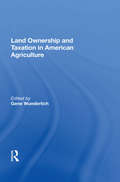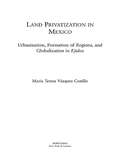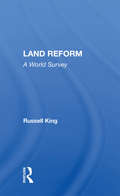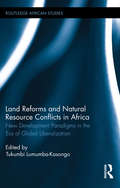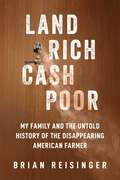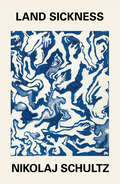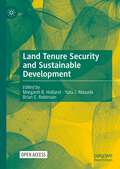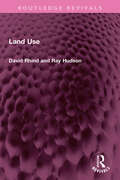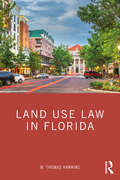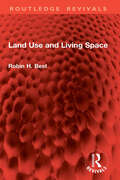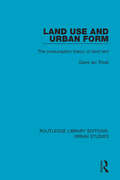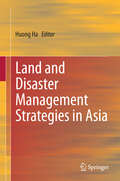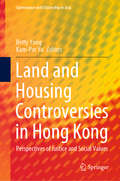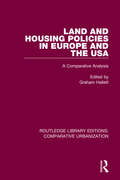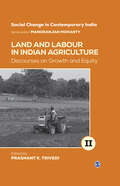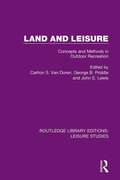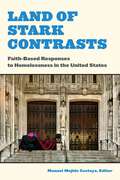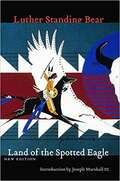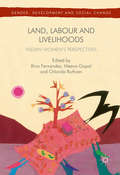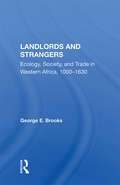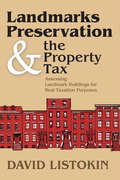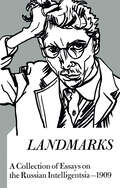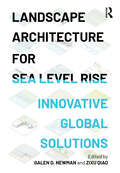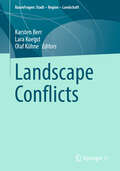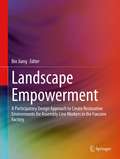- Table View
- List View
Land Ownership And Taxation In American Agriculture
by Gene WunderlichThis book examines the foundations of the system for owning and taxing agricultural land in the United States. It considers the conditions of land policy at several levels of government and questions some of the historical views of progress.
Land Privatization in Mexico: Urbanization, Formation of Regions and Globalization in Ejidos
by Maria Teresa Vázquez-CastilloThis book analyzes [ejido] land as space of urbanization and location of economic activities and capital and land privatization as a redistributive process with local, urban, regional and global consequences.
Land Reform: A World Survey
by Russell KingThis book lays down some general themes and principles in the study of land reform and traces the historical evolution of the concept of land reform. It constitutes a continent-based country-by-country survey of the significant recent reforms in the less developed countries.
Land Reforms and Natural Resource Conflicts in Africa: New Development Paradigms in the Era of Global Liberalization (Routledge African Studies)
by Tukumbi Lumumba-KasongoThis book is a critical examination of the place and role of land in Africa, the role of land in political formation and national identification, and the land as an economic resource within both national economic development and liberal globalization. Colonial and post-colonial conflicts have been rooted in four related claims: the struggle over scarce resources, especially access to land resources; abundance of natural resources mismanaged or appropriated by both the states, local power systems and multinationals; weak or absent articulated land tenure policies, leading to speculation or hybrid policy framework; and the imperatives of the global liberalization based on the free market principles to regulate the land question and mineral appropriation issue. The actualization of these combined claims have led to conflicts among ethnic groups or between them and governments. This book is not only about conflicts, but also about local policy achievements that have been produced on the land question. It provides a critical understanding of the forces and claims related to land tenure systems, as part of the state policy and its system of governance.
Land Rich, Cash Poor: My Family's Hope and the Untold History of the Disappearing American Farmer
by Brian ReisingerThe hidden history of an economic and cultural crisis that is threatening our very food supply—the disappearance of the American farmer. Taking on this working-class story of heart and hardship, award-winning writer Brian Reisinger weaves forgotten eras of American history with his own family&’s four-generation fight for survival in Midwestern farm country. Readers learn the truth about America&’s most detrimental and unexplained socioeconomic crisis: How the family farms that feed us went from cutting a middle-class path through the Great Depression to barely making ends meet in modern America. Along the way, they&’ll see what it truly takes to feed our country: accidents that can kill or maim; weather that blesses or threatens; resilience in the face of crushing economic crises, from depressions and recessions to COVID-19; and the tradition that presses down on each generation when you're not just fighting for your job, you're fighting for your heritage. With newly analyzed data, sharp historical analysis, conversations with some of modern farming&’s most notable champions and critics alike, honest debate, and personal storytelling, Reisinger reveals how the hollowing out of rural America is affecting every single American dinner table. Food prices soaring far beyond the rate of inflation, a vulnerable food supply chain, environmental and ecological dilemmas, the security of our farmland from foreign adversaries, a mental health crisis that includes farmer suicides and addictions, a deepening urban-rural divide, and more worries than ever about what&’s for dinner. These are all becoming the hallmarks of a food system that has long stood as a modern miracle. Land Rich, Cash Poor offers the honest truth about these issues, and a candid look at what we can do about them—before it&’s too late.
Land Sickness
by Nikolaj SchultzAs a heatwave hits Paris, the author’s entire existence is disrupted and disoriented by the effects of climate change. All his normal reference points are destroyed. To escape the heat and his growing anxieties, he flees to the small Mediterranean island of Porquerolles. But even in this idyllic setting, can he escape the harsh realities of the Anthropocene? Written as a fictionalized travelogue based on the author’s own experiences, this inquiry into the issues raised by the climate crisis will be of interest to everyone concerned about the increasingly dire situation in which we find ourselves on our climate-damaged planet.
Land Tenure Security and Sustainable Development
by Margaret B. Holland Yuta J. Masuda Brian E. RobinsonThis open access book presents a nuanced and accessible synthesis of the relationship between land tenure security and sustainable development. Contributing authors have collectively worked for decades on land tenure as connected with conservation and development across all major regions of the globe. The first section of this volume is intended as a standalone primer on land tenure security and its connections with sustainable development. The book then explores key thematic challenges that interact directly with land tenure security, followed by a section on strategies for addressing tenure insecurity. The book concludes with a section on new frontiers in research, policy, and action. An invaluable reference for researchers in the field and for practitioners looking for a comprehensive overview of this important topic.This is an open access book.
Land Use (Routledge Revivals)
by Ray Hudson David RhindOriginally published in 1980, this book draws together a wide range of studies dealing with various aspects of land use in a text specifically designed to guide students through the complexities of the subject. It examines the history of the subject, its techniques, applications, the models that it applies and the frameworks within which it has been carried out. Land use remains a central political and practical issue in contemporary society.
Land Use Law in Florida
by W. Thomas HawkinsLand Use Law in Florida presents an in-depth analysis of land use law common to many states across the United States, using Florida cases and statutes as examples. Florida case law is an important course of study for planners, as the state has its own legal framework that governs how people may use land, with regulation that has evolved to include state-directed urban and regional planning. The book addresses issues in a case format, including planning, land development regulation, property rights, real estate development and land use, transportation, and environmental regulation. Each chapter summarizes the rules that a reader should draw from the cases, making it useful as a reference for practicing professionals and as a teaching tool for planning students who do not have experience in reading law. This text is invaluable for attorneys; professional planners; environmental, property rights, and neighborhood activists; and local government employees who need to understand the rules that govern how property owners may use land in Florida and around the country.
Land Use and Living Space (Routledge Revivals)
by Robin H. BestFew people have any coherent idea of whether the shifts taking place in land-use structure are critically important for us all, or whether they are largely immaterial. This book (originally published in 1981) by setting down a more quantified and carefully researched statement and appraisal of land-use structure and change than had previously been attempted, shows that much of the conventional wisdom about land use can be shown to be incorrect or very suspect. Land-use planning has often been built on the insecure foundation of myth rather than reality, the author maintains. Land Use and Living Space shows that much of the perceived land problem in Britain is not substantiated by evidence on the ground and concludes that there is no real ‘problem’ at all. This analysis was a welcome contribution to the debate during the 1970 and 80s about the true state of land use in Britain, Europe and the USA.
Land Use and Urban Form: The Consumption Theory of Land Rent (Routledge Library Editions: Urban Studies #23)
by Grant Ian ThrallOriginally published in 1987. The Consumption Theory of Land Rent or CTLR is a comprehensive model of the urban landscape developed by Grant Ian Thrall. Working from the basic idea that the same underlying processes account for the spatial structure of all places, Thrall shows how CTLR can be used as a tool to explain and predict the long-term consequences of policy decisions by governments, such as introducing light rail rapid transit, or parameter changes in the economy, such as a general rise in real income. Thrall’s methodology for the analysis of land rent and land use in a significant research accomplishment and a major analytical tool for students and professionals within city planning, regional science, urban geography, and urban economics.
Land and Disaster Management Strategies in Asia
by Huong HaThis book focuses on land and disaster governance in Asian countries. The Asian region has become increasingly vulnerable to natural disasters, including floods, cyclones, storms, earthquakes, drought, typhoons and tsunamis. Further, as a result of unsustainable changes being made in patterns of land use, catchment and coastal zones, increasing population density, migration patterns, and the spread of consumer culture across countries, the impact of natural disasters has increased manifold. The book addresses two major concerns in this field. Firstly, it discusses topics intended to raise awareness among all stakeholders of the critical aspects of disaster management in the context of Asia. Secondly, it calls upon policymakers, researchers, academics, practitioners, private enterprises and civil society organizations, as well as all those who have been, are and will be affected by natural disasters to search for innovative and novel approaches to reducing risk and managing disasters.
Land and Housing Controversies in Hong Kong: Perspectives of Justice and Social Values (Governance and Citizenship in Asia)
by Betty Yung Kam-Por YuThis book discusses land and housing controversies in Hong Kong, which offer a point of reference for the comparison and analysis of similar or contrasting cases overseas from the perspective of social values. It enhances readers’ understanding of the social values, philosophical and theoretical issues that underpin land and housing controversies, as well as their policy implications. The discussion in each chapter goes beyond mere substantive and contextual analysis, and is explicitly positioned and theorized within the broader context of social values, with a theoretical and philosophical framework for assessing the issue concerned. The book is interdisciplinary in nature, with each chapter integrating two or more disciplines to examine various controversial land and housing issues.
Land and Housing Policies in Europe and the USA: A Comparative Analysis
by Graham HallettOriginally published in 1988, this book concentrates on urban land policy and was particularly significant when it was originally published because the 1980s were an era when the rich were getting richer and the poor poorer and in which changes in the ownership of and access to real estate contributed to this polarisation. The book focusses on some core topics, namely: The buying, selling and holding of land by public agencies; the land market, including the impact of taxation and subsidisation; the control of the land market through town planning controls. There are chapters devoted to urban land policy in the former West Germany, The Netherlands, France, the former Yugoslavia, the UK and USA.
Land and Labour in Indian Agriculture: Discourses on Growth and Equity (Social Change in Contemporary India)
by Manoranjan Mohanty Prashant K. TrivediLand and Labour in Indian Agriculture: Discourses on Growth and Equity presents empirically grounded analytical essays on principal concerns of the agrarian question in India. It brings together important contributions from eminent experts focusing on agricultural and rural development, land and labour, and policymaking. Looking at agricultural development as a means of improving the quality of life in rural areas, the essays capture shifts not only in policymaking but also in ground realities and explain why the rural crisis persists in India. The editor’s introductions put in perspective the essays on the evolution of the agrarian discourse, policy deliberations, and performance and trends in rural development. The series ‘Social Change in Contemporary India’ brings together key texts published in the prestigious journal Social Change, from 1971 till present times. These writings, most of which are considered canonical, address important issues in health, education, poverty and agriculture with special focus on disadvantaged groups. These writings will help readers identify key points in the history of policymaking in India and major discourses and debates and their impact.
Land and Leisure: Concepts and Methods in Outdoor Recreation (Routledge Library Editions: Leisure Studies)
by Carlton S. Van DorenFirst published in 1974. Leisure has come to be a vital force in our lives, a part of self-discovery, essential for our well-being. With increased amounts of leisure time, there has been rapid growth in the demand for diverse recreational facilities and their subsequent overuse. With this in mind, it is clear why the planning, managing and administration of recreational resources, particularly in urban areas, is of personal interest to everyone. Land and Leisure introduces the student to all aspects of recreational land use - spatial, economic, behavioural and physical. This second edition is designed to demonstrate some of the basic up-to-date ideas and issues of the last decade and a half that have been influential in shaping decisions, and is concerned both with urban recreation and the uses of resources within metropolitan areas and with the role of the private sector in providing facilities. The book is divided into five parts with discussions ranging over topics such as the individual's recreational needs, recreational land-use evaluation, regional planning and the problems of decision-making and the provision of recreational resources. Its interdisciplinary approach will enable students to understand the problems, concepts, methods and approaches helpful in furthering and integrating their knowledge of recreational resources.
Land of Stark Contrasts: Faith-Based Responses to Homelessness in the United States
by Manuel Mejido CostoyaAn important new volume showcasing a wide range of faith-based responses to one of today’s most pressing social issues, challenging us to expand our ways of understanding. Land of Stark Contrasts brings together the work of social scientists, ethicists, and theologians exploring the profound role of religion in understanding and responding to homelessness and housing insecurity in all corners of the United States—from Seattle, San Francisco, and Silicon Valley to Dallas and San Antonio to Washington, D.C., and Boston.Together, the essays of Land of Stark Contrasts chart intriguing ways forward for future initiatives to address the root causes of homelessness. In this way they are essential reading for practical theologians, congregational leaders, and faith-based nonprofit organizers exploring how to combine spiritual and material care for homeless individuals and other vulnerable populations. Social workers, nonprofit managers, and policy specialists seeking to understand how to partner better with faith-based organizations will also find the chapters in this volume an invaluable resource.Contributors include James V. Spickard, Manuel Mejido Costoya and Margaret Breen, Michael R. Fisher Jr., Laura Stivers, Lauren Valk Lawson, Bruce Granville Miller, Nancy A. Khalil, John A. Coleman, S.J., Jeremy Phillip Brown, Paul Houston Blankenship, María Teresa Dávila, Roberto Mata, and Sathianathan Clarke.Co-published with Seattle University’s Center for Religious Wisdom and World Affairs
Land of the Spotted Eagle
by Joseph Marshall Luther Standing BearWhen Standing Bear returned to the Pine Ridge Sioux Reservation after sixteen years' absence, his dismay at the condition of his people may well have served as a catalyst for the writing of this book, first published in 1933. <p><p> In addition to describing the customs, manners, and traditions of the Teton Sioux, Standing Bear also offered general comments about the importance of Native cultures and values and the status of Indian peoples in American society. With the assistance of Melvin R. Gilmore, curator of ethnology at the University of Michigan, and Warcaziwin, Standing Bear’s niece and secretary, Standing Bear sought to tell the white man “just how” they “lived as Lakotans.” <p><p> Land of the Spotted Eagle is generously interspersed with personal reminiscences and anecdotes, including chapters on child rearing, social and political organization, family, religion, and manhood. Standing Bear's views on Indian affairs and his suggestions for the improvement of white-Indian relations are presented in the two closing chapters.
Land, Labour and Livelihoods: Indian Women's Perspectives (Gender, Development and Social Change)
by Orlanda Ruthven Bina Fernandez Meena GopalThis book brings together a unique collection of theoretical and empirical analyses of women’s access to land, labour and livelihoods in contemporary India. The authors recognize that gender relations must be viewed intersectionally, along with other social relationships such as caste, ethnicity, religion, sexuality and age, in order to inform an integrated analysis of women’s persistent disadvantage in India. The chapters examine a diverse range of rural and urban livelihoods within sectors such as tea plantations, nursing, hair salons, sex work and waste collection. Documenting the shifts in these sectors in the context of economic liberalization, the authors offer insights on the challenges of development interventions as women negotiate shifts in their livelihood options. Written to engage, the contributions to this book will be of interest both to the general reader and to academics and practitioners in development and gender/women’s studies.
Landlords And Strangers: Ecology, Society, And Trade In Western Africa, 1000-1630
by George E BrooksParticipants included scholars, government officials, and journalists from European and American countries ranging from Finland to Argentina. This volume contains the papers presented. The viewpoints represent those who favor a negotiated settlement through the Contadora process, those who espouse the policies of the Reagan administration, and thos
Landmarks Preservation and the Property Tax: Assessing Landmark Buildings for Real Taxation Purposes
by David ListokinHistoric preservation is an issue of growing importance and public commitment. Federal and state mechanisms have been established to identify and support historic buildings/sites, while local governments have been active in supporting and protecting historic resources. Communities across the country have established designation programs whereby individual buildings or districts of historical-architectural significance are accorded landmark status. Designation activity has been accompanied by growing interest in other local incentives/disincentives to the support of historic buildings. In this regard, the property tax is viewed as either a possible powerful drawback to or a catalyst of preservation. This study examines the relationship between historic preservation and the property tax, focusing on the question of how designated buildings should be assessed for real taxation purposes. Listokin focuses on New York City in considering the effects of historic status on property value and in evaluating assessment practices. But this book's findings are transferrable to other communities because the base conditions are similar. Many other cities have designation programs modeled on New York City's. In addition, New York's property-tax system and administrative processes resemble those found in communities across the nation. To enhance the transferability of this study's findings, Listokin refers to the national experience and literature, typically on a side-by-side basis with the New York City counterpart.
Landmarks: A Collection of Essays on the Russian Intelligentsia 1909
by Boris ShraginWritten from a particular point of view, this text still stands as one of the key studies on the thought-world of the Russian intelligentsia. It will be of interest to students of Russian social and political thought as to those of intellectual history as well.
Landscape Architecture for Sea Level Rise: Innovative Global Solutions
by Galen D. Newman Zixu QiaoThis book assesses and illustrates innovative and practical world-wide measures for combating sea level rise from the profession of landscape architecture. The work explores how the appropriate mixture of integrated, multi-scalar flood protection mechanisms can reduce risks associated with flood events including sea level rise. Because sea level rise is a global issue, illustrative case studies performed from the United States, Korea, Australia, New Zealand, Thailand, Japan, China, and the Netherlands identify the structural (engineered), non-structural (nature-based), and hybrid mechanisms (mixed) used to combat sea level rise and increase flood resilience. The alternative flood risk reduction mechanisms are extracted and analyzed from each case study to develop and explain a set of design-based typologies to combat sea level rise which can then be applied to help proctor new and existing communities. It is important for those located within the current or future floodplain considering sea level rise and those responsible for land use, developmental, and population-related activities within these areas to strategically implement a series of integrated constructed and green infrastructure-based flood risk reduction mechanisms to adequately protect threatened areas. As a result, this book is beneficial to both academics and practitioners related to multiple design professions such as urban designers, urban planners, architects, real estate developers, and landscape architects.
Landscape Conflicts (RaumFragen: Stadt – Region – Landschaft)
by Olaf Kühne Karsten Berr Lara KoegstLandscape conflicts, for example in connection with / in view of the energy transition, climate policy, transport policy, nature conservation, the extraction of mineral raw materials, the design of urban landscapes or tourism are potentially associated with high economic, social and political costs even before a possible escalation. It is therefore undoubtedly useful to gain a better understanding of landscape-related conflicts in terms of their causes, their course, their dynamics, their inherent logic and possible regulatory procedures. Frequently, such conflicts manifest themselves in particular in different claims and aspired or arrogated interpretative sovereignties concerning what can or may be considered together as 'landscape' (here understood as a special case to 'space'), and these conflicts are not limited to the economic dimension, but they also ignite in social, political and cultural, often also in aesthetic and moral questions. The contributions to this anthology therefore focus on the question of how landscape conflicts can be seen as a productive social normality and be brought to a non-violent and not necessarily consensual settlement.
Landscape Empowerment: A Participatory Design Approach to Create Restorative Environments for Assembly Line Workers in the Foxconn Factory
by Bin JiangThis book discusses essential strategies and approaches to creating mentally restorative environments for highly stressed and depressed workers at sweatshop factories. Drawing on the Foxconn factory in Longhua, China and an adjacent urban village as a sample site for research and design practice, the book employs a bottom-up and participatory process. The content is divided into two main parts, the first of which investigates economic, cultural, human rights, and environmental issues related to the electronic industry and urban village, providing in-depth research on various aspects, especially the working and living conditions for Foxconn workers. Based on these findings, the second part highlights potential landscape designs to address a range of issues, locations, and scales. The book’s goals are to provide a set of original methods for research and design practice in a complex social and economic context, and to raise awareness regarding the health, dignity and freedom of millions of workers.
